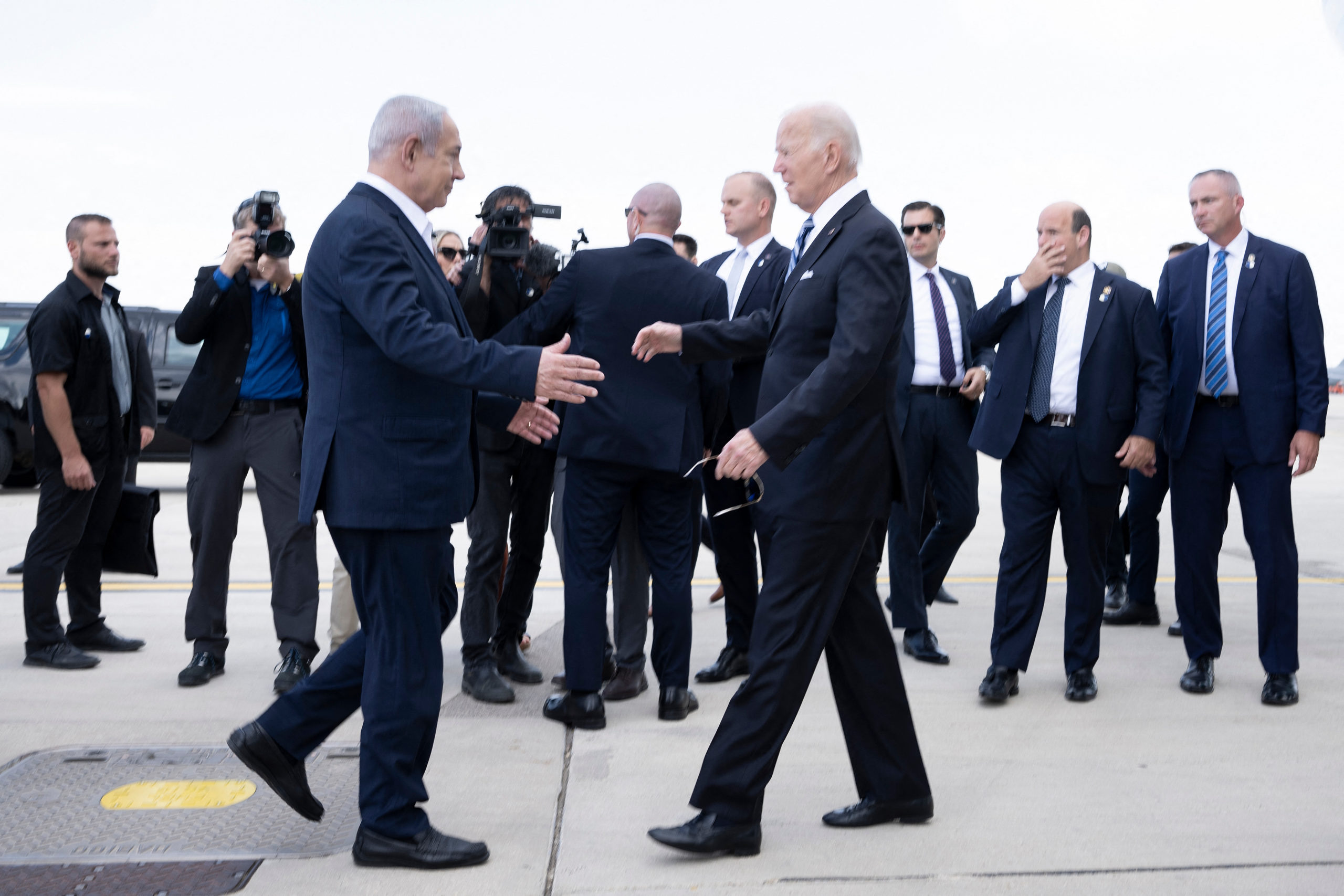Israel is weighing retaliation options against Iran, which attacked the country on Saturday, as the Biden administration ramps up calls for restraint.
Iran launched hundreds of ballistic missiles and suicide drones at Israel on Saturday — the vast majority of which were intercepted or missed their targets — in retaliation for Israel’s airstrikes on a diplomatic compound in Syria that killed several high-level Iranian military operatives on Apr. 1. Israel’s war cabinet convened on Monday to weigh response options as the Biden administration and European allies are calling on the country to deescalate the situation and embrace a diplomatic approach, rather than a military one. (RELATED: Biden Admin Worries Behind Closed Doors That Iran Will Strike US Targets Over Defense Of Israel: REPORT)
President Joe Biden told Israeli Prime Minister Benjamin Netanyahu on Saturday he needed to “take the win” from Iran’s failed attack, which was also deterred by U.S. forces in the region, underscoring concerns that an Israeli response could spark a broader regional conflict, a senior administration official told Axios. Defense Minister Yoav Gallant told U.S. Defense Secretary Lloyd Austin during a phone call on Sunday there must be a response to Iran, according to a U.S. official and source familiar with the call who spoke to Axios, though it’s unclear what such a response could look like.
Documentation of ballistic missiles striking the Negev earlier tonight. pic.twitter.com/xgb8HlMraX
— Joe Truzman (@JoeTruzman) April 14, 2024
It is unacceptable to allow Iran to launch an attack directly from within its soil when Israel strikes Iranian targets inside of Syria, Gallant reportedly told Austin.
“I do expect the Israelis to respond, including inside of Iran,” Simone Ledeen, Former Deputy Assistant Secretary of Defense for the Middle East told the Daily Caller News Foundation. “It will look like the response of a country whose citizens have been attacked by drones, cruise and ballistic missiles. The Israelis view this as their 2nd War of Independence, to give you an idea of the seriousness of the situation. As for calls on Israel not to respond military — in my view that is absurd, and therefore should not be taken seriously. Israel must respond decisively.”
It is the first time Tehran has chosen to launch a strike from directly within its soil against Israel since Oct. 7, the day Hamas, an Iranian-backed terror group, invaded Israel and killed roughly 1,200 people, prompting a massive Israeli counter-offensive. Until Saturday, Iran has solely relied on its network of terror groups throughout the Middle East to launch attacks against Israel and its allies.
Netanyahu asked the Israel Defense Forces (IDF) to provide him with a readout of potential targets and strike options, including hitting a facility inside of Tehran or launching a cyberattack, an official familiar with the talks told The Washington Post. Israel will likely engage in some sort of retaliatory response, but it’s likely to be measured so as to not spark broader regional conflict, Gabriel Noronha, executive director of Polaris National Security and former State Department official, told the DCNF.

ARLINGTON, VIRGINIA – MARCH 26: U.S. Secretary of Defense Lloyd Austin speaks during a meeting with Israeli Minister of Defense, Yoav Gallant at the Pentagon on March 26, 2024 in Arlington, Virginia. Gallant is visiting the United States to meet with members of U.S. President Joe Biden’s cabinet and administration officials. (Photo by Anna Moneymaker/Getty Images)
“Part of this is that the West would be smart if they actually offered tangible, real consequences on Iran to supplement or replace some of this kinetic action which Israel is considering. I think Israel still has to do something retaliatory, that can be kinetic, that can be cyber, that can be covert action, but they have to do something just to rebalance, or to settle the score,” Noronha told the DCNF. “I don’t think in that Israeli response, they need to do anything lethal. I think if they take out either critical ballistic missile or drone-related infrastructure facilities, or perhaps oil-related, energy-related facilities, without causing the high casualties, I think that’s sort of a way to demonstrate, ‘Hey, you can’t go and launch missiles into our territory without consequence. But we’re not trying to turn into a tit-for-tat.'”
“Now the issue is that Iran is doing some interesting messaging. They’re basically saying, ‘If Israel responds, we will respond 10 times greater.’ That’s ridiculous, they don’t have like they don’t have the measures to do that unilaterally,” Noronha told the DCNF. “One thing is attacked demonstrated is that Iran’s conventional capabilities to attack Israel on their own are really bad. They don’t have they don’t have the ability, apparently, to actually hit targets on their own without using their [terror] proxies.”
Other experts speculated that striking back at Tehran could open a new front of conflict between Israel and Iran, which may threaten Israel’s — already fighting a war in Gaza — national security.

US President Joe Biden (L), sits with Israeli Prime Minister Benjamin Netanyahu, at the start of the Israeli war cabinet meeting, in Tel Aviv on October 18, 2023, amid the ongoing battles between Israel and the Palestinian group Hamas. US President Joe Biden landed in Tel Aviv on October 18, 2023 as Middle East anger flared after hundreds were killed when a rocket struck a hospital in war-torn Gaza, with Israel and the Palestinians quick to trade blame. (Photo by MIRIAM ALSTER/POOL/AFP via Getty Images)

US President Joe Biden (L) and Israel’s Prime Minister Benjamin Netanyahu speak prior to their statements and meeting in Tel Aviv on October 18, 2023, amid the ongoing battles between Israel and the Palestinian group Hamas. US President Joe Biden landed in Tel Aviv on October 18, 2023 as Middle East anger flared after hundreds were killed when a rocket struck a hospital in war-torn Gaza, with Israel and the Palestinians quick to trade blame. (Photo by BRENDAN SMIALOWSKI/AFP via Getty Images)

Israel Prime Minister Benjamin Netanyahu (L) greets US President Joe Biden upon his arrival at Tel Aviv’s Ben Gurion airport on October 18, 2023, amid the ongoing battles between Israel and the Palestinian group Hamas. (Photo by BRENDAN SMIALOWSKI/AFP via Getty Images)
“The Iron Dome system along with all the allied air power knocking down drones and missiles, performed brilliantly — this time. But Israel burned through a lot of interceptor missiles to knock down those cheap Iranian drones,” retired Lt. Col. Daniel Davis, a senior fellow and military expert at Defense Priorities, told the DCNF. “It seems likely that Iran can produce a lot more Shahid and similar type drones than Israel has Iron Dome and Patriot interceptor missiles.”
“If the two sides get into a sustained war measured in months, Israel may soon find itself with insufficient air defenses,” Davis told the DCNF. “Then even the slow-moving, unsophisticated Shahid drones would cause major harm to Israeli targets, as they pack a significant warhead and have excellent guidance systems.”
During their phone call on Sunday, Gallant told Austin that the current standoff with Tehran creates an opportunity to form “a strategic alliance to counter the threat posed by Iran,” according to Axios. But Biden told Netanyahu during their phone call a day prior that the U.S. would not participate in or support an Israeli counterattack against Iran, which could spur Israel not to strike, Davis told the DCNF. (RELATED: ‘Smoked That Iranian General’: Sen. Fetterman Praises Israel, Urges Continued Support For Ally)
“Netanyahu is now in a tough position, because if he strikes into Iran now — and especially if he hits Iranian nuclear facilities — he may get condemnation from some quarters in the West,” Davis told the DCNF.

WASHINGTON, DC – SEPTEMBER 15: U.S. President Donald Trump and Prime Minister of Israel Benjamin Netanyahu participate in a meeting in the Oval Office of the White House on September 15, 2020 in Washington, DC. Netanyahu is in Washington to participate in the signing ceremony of the Abraham Accords. (Photo by Doug Mills/Pool/Getty Images)

WASHINGTON, DC – SEPTEMBER 15: U.S. President Donald Trump and Prime Minister of Israel Benjamin Netanyahu participate in a meeting in the Oval Office of the White House on September 15, 2020 in Washington, DC. Netanyahu is in Washington to participate in the signing ceremony of the Abraham Accords. (Photo by Doug Mills/Pool/Getty Images)

WASHINGTON, DC – NOVEMBER 10: Israeli Prime Minister Benjamin Netanyahu (C) poses for photographs with (L-R) Sen. Ben Cardin (D-MD), Senate Minority Whip Richard Durbin (D-IL), Sen. Dianne Feinstein (D-CA), Senate Minority Leader Harry Reid (D-NV), U.S. Senate Majority Leader Mitch McConnell (R-KY), Sen. Mike Rounds (R-SD), Sen. Tom Cotton (R-AR) and Sen. Richard Blumenthal (D-CT) in the Strom Thurmond Room at the U.S. Capitol November 10, 2015 in Washington, DC. Netanyahu met with U.S. President Barack Obama a day earlier when the two leaders talked about fighting terrorism, the conflict in Syria and healing their rift over the Iran nuclear deal. (Photo by Chip Somodevilla/Getty Images)
Biden has been criticized for taking a policy of appeasement toward Iran in a bid to try and deter the country from acting hostile to U.S. allies. The Biden administration allowed Iran access to billions of dollars after failing to enforce oil sanctions, paying “ransom” for six hostages in late 2023 and extending a sanctions waiver so that Tehran could have access to revenues made from Iraqi energy transactions.
“President Biden needs to face reality: His policies of appeasing Iran while waging political warfare against Israel led Tehran to conclude it could launch a massive attack on Israel and face no consequences,” Richard Goldberg, senior fellow at FDD, wrote on Sunday. “The White House has been showering Tehran with access to cash in hopes of incentivizing better behavior.”
“It’s quite logical for the mullahs to examine the record and conclude a strategic-level strike on Israel would end in two results: zero consequences for Tehran and pressure on Israel not to respond,” Goldberg said. “Israel, however, has no choice but to respond forcefully to this attack — imposing costs high enough on Tehran to turn the ayatollah’s calculation into a miscalculation.”
The White House did not immediately respond to a request for comment.
All content created by the Daily Caller News Foundation, an independent and nonpartisan newswire service, is available without charge to any legitimate news publisher that can provide a large audience. All republished articles must include our logo, our reporter’s byline and their DCNF affiliation. For any questions about our guidelines or partnering with us, please contact licensing@dailycallernewsfoundation.org.


